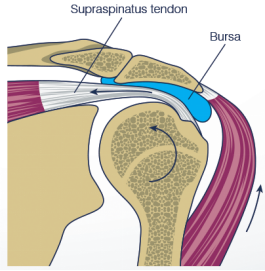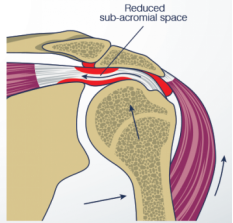

Deltoid and supraspinatus muscle forces acting on shoulder joint on arm elevation -
(Left) Normal
(Right) Impingement syndrome
Overview of Treatment Shoulder Impingement
Inflammation or swelling of rotator cuff tendon covering the upper arm bone (humeral head) is called rotator cuff tendinitis. Shoulder impingement means pinching of the rotator cuff tendons between proximal humerus bone and bony acromial process of scapular blade. Impingement occurs when arm is lifted front or sideways. Lead to tendon inflammation, swelling which further leads to less room for tendon to move (Vicious cycle) and leading continuous pain more with movement that involves lifting of arm.
Non-surgical treatment is usually first line of treatment for shoulder impingement. The goal of treatment is to reduce shoulder pain while restoring joint function.
- Rest: Dr. Abhijit Ranaware will suggest rest in the form of reduce overhead activity and start medical treatment to reduce inflammation and pain.
- Physiotherapy: Patient is referred to in-house physiotherapist and advised to do exercise program to stretch shoulder joint capsule and strengthen the rotator cuff muscle to prevent further impingement.
- Shoulder joint Injection: Dr. Abhijit Ranaware may also recommend an corticosteroid injection into the sub-acromial bursa for patients with severely painful movements.

A steroid injection may relieve painful symptoms due to impingement
Dr. Abhijit Ranaware will perform Arthroscopic surgery (key-hole incision) by the telescope (Arthroscope) with attached camera display images of inflamed tissue and if any damaged the cuff tendon on video monitor. After visualizing all shoulder joint pathology, inflamed bursa / sac and sometimes worn-off long head of biceps tendon is removed. If bone spurs are present, he will remove them with specialized instrument like burr and radiofrequency ablation (Laser).
Excision of bursa and bony spur beneath acromion
The smoothed down area and removed inflamed tissue will reduce pressure on rotator cuff tendon and allow a pain-free range of motion.
Dr. Abhijit Ranaware, Shoulder and Arthroscopy Surgeon in Pune is highly experienced to treat rotator cuff impingement syndrome with minimally invasive surgery technique and helps patients in returning to a healthy and active lifestyle.
Do you have shoulder Shoulder Impingement?
You can consult Dr. Abhijit Ranaware (Knee and sports injury Specialist)
Book Appointment by Filling Form Below:
Post-operative rehab
After surgery patient is suggested to apply ice and sling is given for initial few days. Patient is discharged from hospital on the same day or immediate next day and advised to undergo supervised physiotherapy sessions. Patient is encouraged to use arm and resume activities of daily living as soon as possible and advised for in-house physiotherapy to prevent stiffness and regain strength. Post-op physiotherapy is aimed to restore movement and strength of muscles which is very important to achieve best results.
After Arthroscopic Surgery patients don’t experience much pain due to longer action of regional nerve block anaesthesia patient which will last 12-18 hours.

